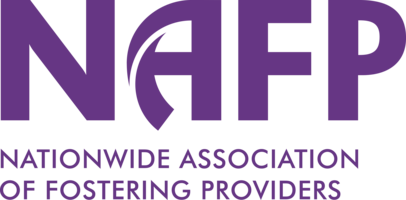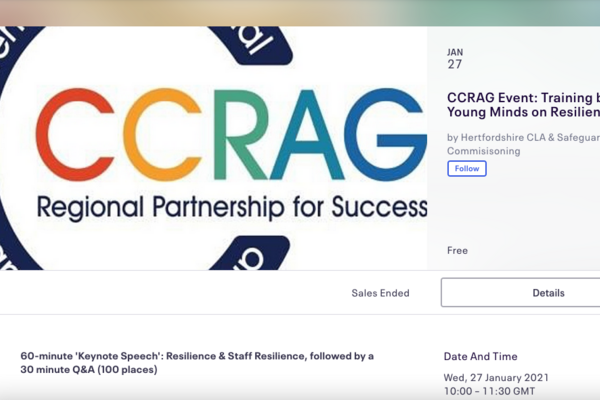Attending the recent conference delivered by YoungMinds for the Children's Cross Regional Arrangements Group (CCRAG) reassured me that there are front line services available to children, their families and carers at a time when our crisis mental health services are bursting. YoungMinds provide young people with tools to look after their mental health. Their ethos is to empower adults to be the best support they can be to the young people in their lives. A key area of support is offering a free support line where qualified clinicians and practitioners are available to talk.
Sarah Berman delivered the conference to raise our awareness of the vulnerability of our young people. To work in a more proactive way rather than reacting to crisis, sounds sensible, right? But how do we do this? How do we recognise when those around us are clearly not displaying good mental health?
Sarah reminded me of the power of words, how they can make us react, jump up and down without really knowing what the meaning is, but the words sound pretty scary! What is a person describing when they tell us they are “anxious” or “depressed”? The stigma of talking about mental health still remains and unfortunately, this will continue to lead to children, young people and adults holding and managing these emotions with devastating outcomes.
Whilst we are all experiencing the restrictions of Covid, some are isolated more than ever, with such missed opportunity for those that know us to see that things are not okay. Closure of schools, workplaces and social environments we all crave for has disrupted our natural nurturing nature to interact. Non-verbal communication is so important to help us see how people have been affected by loss, bereavement, ill-health or change, and when we are experiencing any of this we surround ourselves with others who can nurture our recovery. There just needs to be one “superstar” that “just gets us” and can see when we are not ourselves, who has a long-lasting memory in our lives. I am sure we can all think of someone that has helped make us who we are today. Wouldn't it be great to be that person for a child?
Sarah is right in saying that as soon as we hear such powerful words associated with vulnerable mental and emotional well-being, we either become a psychiatrist overnight and diagnose acute mental health needs (helped by our friend, the internet), or we completely shut down and don't know what to say. We fear what we might be told and worry that we are unable to deal with it, or make things worse.
A great example used by Sarah was how we actually respond to physical health. Something we are all experts in, right? A child says they have a tummy ache, what do you do? You become curious and ask the child to tell you what it feels like, where it is, have they had a drink of water today, what have they eaten, when did it start etc. and we help them to feel better. The starting point for us to understand the emotions children are enduring is to adopt the same principles and DESCALE the language. This doesn't mean you aren't taking what they are saying seriously, but we don't instantly think of a “tummy ache” as “acute appendicitis”. What a great way to look at it. Thank you, Sarah!
So when a child is saying they are anxious, we can be more curious and ask, Do you know what is worrying you? How does it stop you doing..? What happens? When this change, or stress is alleviated are they able to do a little better? Breaking down the barriers encourages a natural and nurturing conversation and often helps to “normalise” things a little. Life has thrown a huge challenge to us and them, and the news only confirms that things are not good. How can we limit that? If we mirror behaviour, react in a way of shock and reaction, it only confirms to the child that they were right, there must be something seriously wrong with them.
It is hard for those fostering the most vulnerable of children to continue to feel motivated, positive, and in control all of the time. Let’s face it, nobody gave us the manual on how to deal with this situation. We are trying to work it out, aren't we? And we don't always get it right. But that’s just fine!
Children coming into fostering during this pandemic are clearly going to be influenced by their environment and may become caught up in this learned behaviour. So a good quote from the conference is, “put your own oxygen mask on first”. It's so true that if we can't start with ourselves and check that we are okay, we can't possibly be expected to support others. It's not selfish, it is fundamental. Compassion and kindness to ourselves helps us to be resilient, stay connected and share our own coping techniques.
I noted the reference to “Ordinary Magic”, a book by Ann Masten, who explores what allows certain individuals to thrive and adapt despite adverse circumstances, such as poverty, chronic family problems, or exposure to trauma. She talks about the little things we do, nothing earth-shattering, the everyday stuff that improves our mood. What can we do right now to improve the odds for those having a tough time? The kind of things we need to make happen.
Sarah uses an “asset focused model”, an opportunity to be aware of the positive strategies we can put in place. Being creative and providing more opportunities to do things we like will build our confidence, resilience and learning. We need to say out loud, “we are doing better than we think and than we ever thought we would in these circumstances”.
A safe and secure adult might just be enough, the difference for the child who should never be defined as “the child in care”, they are the child who likes football or music and they are at their calmest when they are given the opportunity to do what they enjoy. How can you make that possible? How can you be that “superstar” that has a long-lasting memory for them, the person who just allowed them to get through the day by providing everyday opportunities to “just be”?
At NAFP, I have the privilege of hearing many inspiring and creative ways that children, foster carers and social workers are managing their emotional well-being. How they are doing much more than getting through the day and how they are finding that one thing that makes a child smile, enables them to give and receive eye contact and feel safe and held. The simple things in life really are free, making time to share a special moment and listen to their latest masterpiece they have created on their keyboard, acknowledgement of how amazing their chocolate brownies taste, and how much you love to laugh with each other when you jump in the puddles together, or just to sit in silence together and know that you are there, sharing the moment.
More information about the resilience in young people and supporting positive mental health can be found on the YoungMinds website.





